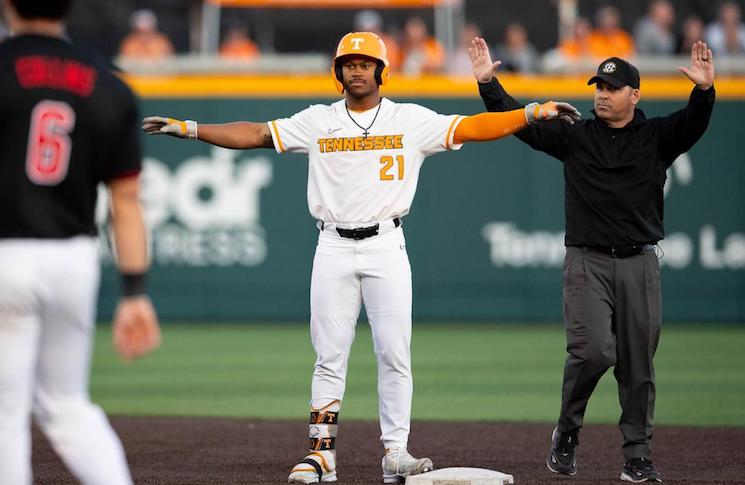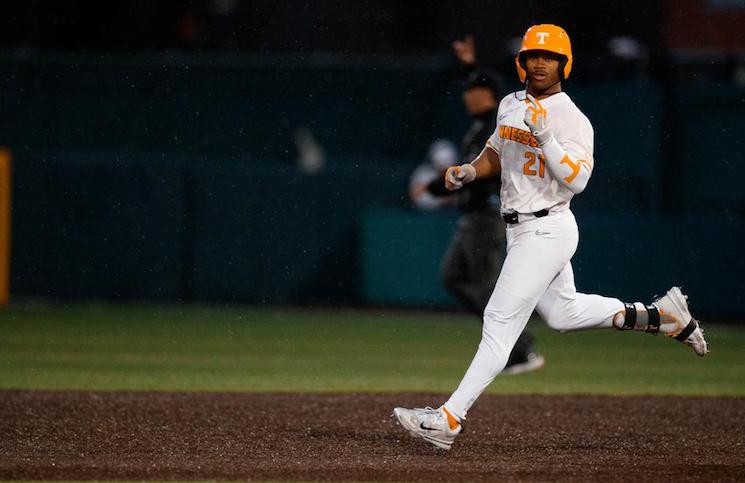
The lights were shining on an empty Lindsey Nelson Stadium at 10 p.m. on an April Wednesday night. Star Tennessee outfielder Kavares Tears finished taking batting practice and offered words of encouragement for catcher Cannon Peebles as the two alternated roles while getting late night work in.
Tears has been in Peebles’ shoes, frustrated with his role while tirelessly working to improve his game. The redshirt sophomore outfielder is the latest player to thrive for Tennessee baseball after waiting years for his turn.
After honing his skills away from the public eye, Tears is showing the country what he’s capable of. He’s one of the best bats in one of the nation’s best lineups and is running with his opportunity.
“You guys see the 10% but the other 90% that you don’t see has been amazing,” Tennessee strength and conditioning coach Quentin Eberhardt told RTI.
More From RTI: Everything To Know About Tennessee Baseball’s Series At Florida
The Conversation That Altered Tears’ Mindset
The 2022 Tennessee baseball team had just dominated UNC-Asheville 16-1 to improve to 4-0. Drew Gilbert, Evan Russell and freshman Kavares Tears were the last players in the Vols’ locker room.
“I think they knew what was going on,” Tears told RTI.
Tears was going through what so many freshman college athletes go through. He had been one of the best players on every team he played on his entire life. Now he was “just like one of the average players” and Tennessee’s coaches informed him two days prior that they planned on redshirting him.
As Tears got up to go work in the batting cages, Gilbert and Russell stopped him and asked how he was feeling. Tears was frustrated that he was redshirting and upset that he wasn’t going to spend his first college season competing.
“They really just just talked through it with me and instead of making everything so negative they gave me the positive side,” Tears said. “If I use this how it’s supposed to be used, this could be something that could really change my trajectory.”
The freshman utility man developed a plan of attack. Tears had always been a good hitter but he was going to develop an approach that would lead to him having more consistent success in the SEC.
Perhaps the most important part of his plan was shaking the utility label and becoming a true outfielder. The Lewisburg, Tennessee native played some center field in high school but spent his senior season playing first base.
Tears latched on to Gilbert, the starting center fielder, and right fielder Jordan Beck. He spent countless hours shagging balls during batting practice, reading the ball off the bat and observing the Vols’ star outfielders.
“He (Beck) would be taking BP and I’d be out there shagging and then if I ever messed something up, he would start yelling at me from home plate,” Tears said. “But then he would come out there and kind of just show me how I could get better, how to take a better route to a fly ball or anything. I just spent most of the year doing that.”
Another beneficial resource for Tears was his roommate Trey Lipscomb. Lipscomb spent three years waiting behind Andre Lipcius and then Jake Rucker at third base. During the 2022 season he broke out as one of the SEC’s best players, hitting .355 with 22 home runs and 84 RBIs.
Lipscomb’s breakout season was proof that Tears’ teammates and coaches were right about what he could grow into if he correctly utilized the redshirt season.
“It’s monumental. Especially with this generation,” Eberhardt said of having a proven track record of developing young bench players. “Maybe if I do (not) just worry about all these other things and just keep improving and try to get a little bit better every single day good things will happen.”
The 2022 season was a crash course for Tears on what having professional work habits and what being a good baseball player looked like. He learned from two players that have already made their MLB debuts and another who is a top 50 MLB prospect.
“I think him learning how to work smart has really helped him,” Eberhardt said. “How to work on the right things.”
“They definitely kind of shaped it into how I try to play today,” Tears said. “I don’t really say this that much, but every time I’m out there I … try to be like how I was kind of shown how we play baseball here, which was our ‘22 season.”

Losing Weight And The Fulfillment Of The Defensive Development
Tears weight fluctuated his first two seasons at Tennessee. He arrived back in Knoxville in August weighing 230 pounds.
“I thought he ate some babies or something,” was Eberhardt’s reaction. “I didn’t know what he was eating.”
Eberhardt told Tears that something had to change. Tears knew he was right. In his first two seasons in Knoxville, Tears had phases where he would clean up his diet and get into better shape but “it was never something that would like last.”
Work with Eberhardt in the weight room was important but cleaning up his eating habits was just as critical.
“I was just talking with (Baseball Team Nutritionist) Miss Beth (Schwartz) probably like once a week because I guess I started to learn new things,” Tears said. “Stuff that I thought I couldn’t eat when I was trying to be healthy. But there’s a lot of stuff that you still can eat. You just kind of have to be smarter about how you do it and how much you do it.”
Things Tears could still eat included beef and chicken— specifically air fried chicken wings— which Schwartz cleared for Tears to eat in certain quantities.
His face lights up when he talks about oatmeal cream pies. They were a staple at the Tears’ house growing up, but he had to cut those and his other favorite Little Debbie snacks out of the rotation.
“For a while when I’d go grocery shopping, I would not go down the chip aisle and anything with desserts in it. I just had to completely avoid it,” Tears said.
As Tennessee progressed through fall practice, Tears kept dropping weight. He was down to 200 pounds by early November and has hovered around that number all season.
“We would always just talk like if you could just clean up certain things it can be dangerous,” Eberhardt said. “I think he started to see that and get a hunger for that. He did the work.”
Tears parlayed the weight loss with the years of shagging balls into becoming a high end defensive outfielder. Beck is the only Vitello era Tennessee outfielder whose arm strength rivals Tears.
He’s learned how to harness that arm, read the ball off the bat better and the weight loss has improved his range.
That’s ✌️
📺 https://t.co/20kbhokGAh (SECN+)#GBO // #OTH // #BeatMizzou pic.twitter.com/OpNxnTOz2i
— Tennessee Baseball (@Vol_Baseball) April 26, 2024
Tears starts most games in right field but has also proved he’s capable of sliding over and playing center field. After having no positional home when he got to Tennessee, Tears has turned himself into one of the best and most versatile defensive outfielders in the conference.
“Really being able to do different things with it. His body is completely changed physically, which has allowed him to cover more range in the outfield,” Tennessee head coach Tony Vitello said. “His reads on balls and being comfortable in all the positions. He has made the most of them and become a real positive asset out there in the outfield for us.”
Never Looking Back And Paying It Forward
Lipscomb made one thing clear to Tears in their year as roommates.
“He would always tell me, ‘when you do get your chance, like never look back. Like never. You should only have nothing but confidence,’” Tears said.
Chances presented themselves in Tears’ redshirt freshman season and the left-handed slugger capitalized. He hit .304 in 56 at-bats and his solo home run in the ninth inning of Tennessee’s series opening win over Vanderbilt helped turn the Vols’ season around.
But a hamstring and then oblique injury in the back half of SEC play sidelined him. By the time he returned, Tennessee had found its stride and players had locked up outfield starting spots.
“I just had to kind of understand that we were doing pretty good,” Tears said. “Once I came back and I felt like, you know, everybody that was out there, I can’t really sit here and be like, ‘why is he playing and I’m not playing?’”
The time was now for Tears entering his redshirt sophomore season. The Vols lost three of their top four outfielders and were banking on Tears becoming a stalwart in the lineup.
He hasn’t disappointed. Starting in 43 of 45 games to date, Tears is hitting .366 with 14 home runs and 37 RBIs. MLB Mock Drafts project Tears to go in the top 100 of this summer’s draft.
Tennessee’s cleanup hitter has delivered in crucial moments including in the seventh inning of the Vols’ series rubber match at Kentucky. Tears fell behind 0-2, fouled off three straight pitches and watched three straight balls before roping a two-run go-ahead home run to right field.
“His at-bat at Kentucky was one of the best at-bats I’ve ever seen but definitely the best at-bat I’ve ever seen from him,” Eberhardt said. “I think it just shows the work he’s put in but it shows his level of focus and him being able to lock in and understand what the goals are each at-bat.”
KT coming up CLUTCH!!!
📺 https://t.co/BqOlt1CUfZ (SECN+)#GBO // #OTH // #BeatUK pic.twitter.com/aePHKWr4Uw
— Tennessee Baseball (@Vol_Baseball) April 21, 2024
The at-bat was exceptional but Tears’ most noteworthy moment came an inning prior when Cannon Peebles sac fly drove Tears home. The Vols’ right fielder met Peebles before he could make it back to the dugout, mobbing him like he just hit a walk off home run.
“That was genuine,” Eberhardt said. “Honest to God, it has to do with these guys playing for each other and worrying about the task at hand and keeping it that simple.”
While Peebles has gone through a frustrating season, Tears has been there to pick him up the same way his teammates did during his freshman season. It’s the completion of a career arc that’s one of the biggest strengths of Vitello’s program.
“He’s put everything together and he’s a quintessential Vol,” Eberhardt said.



